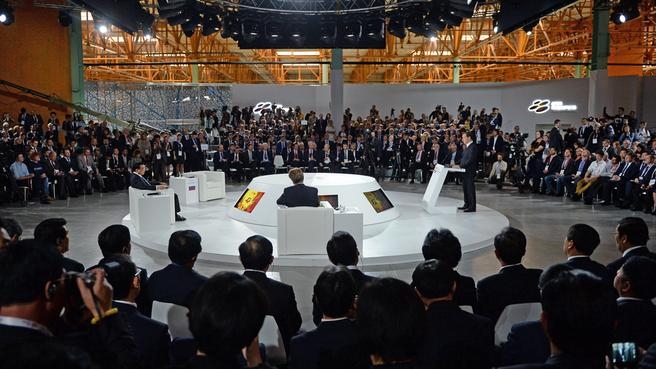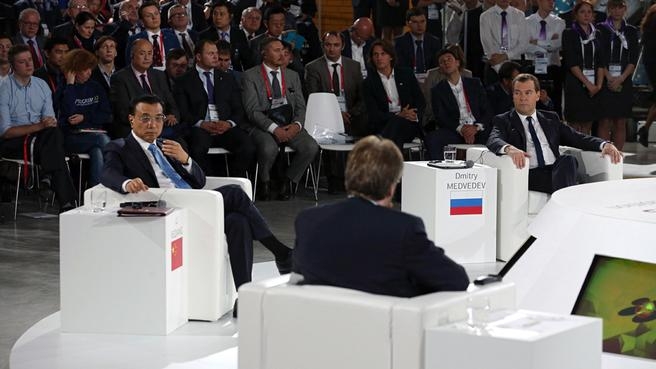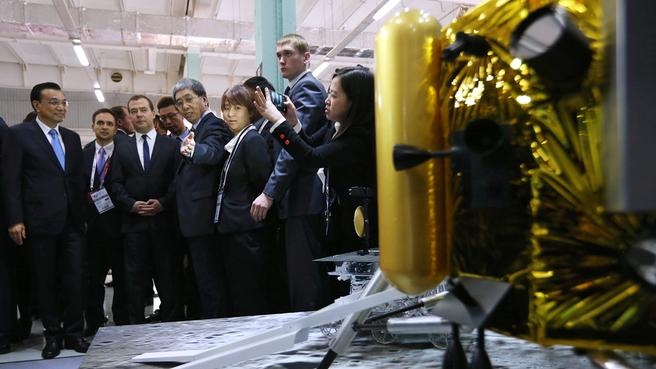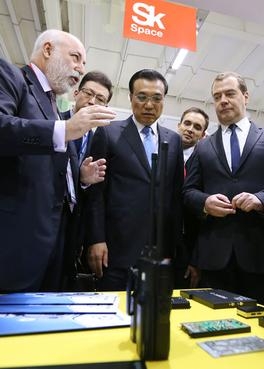This plenary session will focus on an emerging global innovation map and ways to close the technological gap between countries.
The Moscow
International Forum for Innovative Development Open Innovations has been held
since 2012. It is aimed at promoting Russian innovative products in foreign
markets, increasing cooperation between Russian and foreign contributors to
innovative development, and boosting Russia’s integration in the global innovation
process.
The key theme this year is Creative Disruption: Staying Competitive in the 21st Century. Forum participants will discuss ways to reformat and retune markets and the influence of this process on various technological sectors and investors in the global innovation system.
Apart from Russian and foreign innovators, the forum will be attended by government officials from Russia and China, the CEOs of leading companies, leading scientists and experts on innovation business, and representatives of startup businesses and venture funds.
Plenary session of the Open Innovations Forum
Transcript:
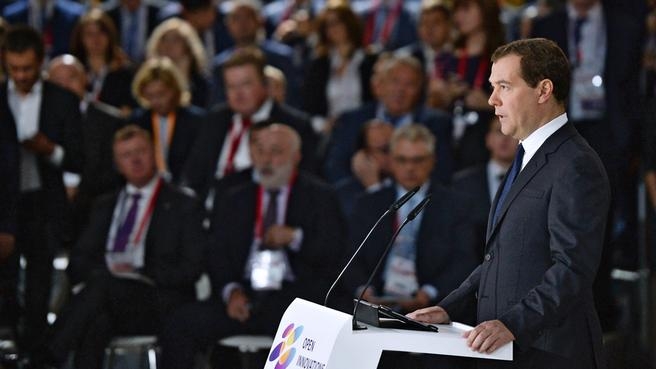
Speaking at the plenary session, The Emerging Global Innovation Map at the Third Moscow Open Innovations Forum
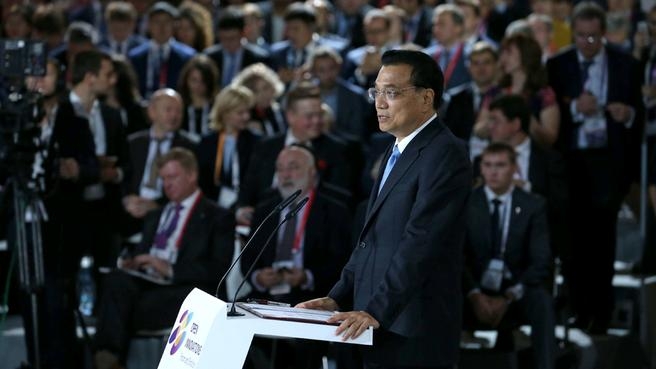
Premier of China Li Keqiang addressing the plenary session, The Emerging Global Innovation Map: Closing the Gap Between Countries
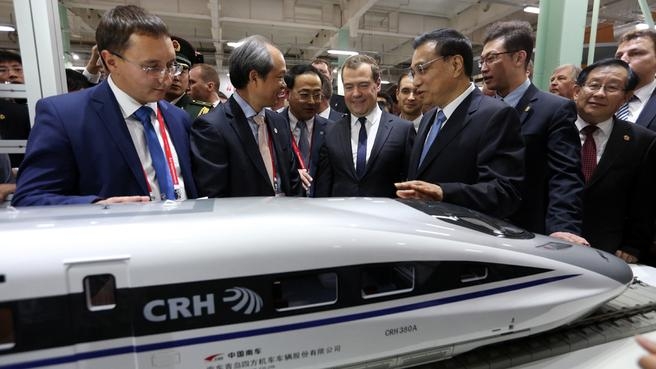
Dmitry Medvedev and Chinese Premier Li Keqiang at the innovative technology exhibition, Third Moscow Open Innovations Forum
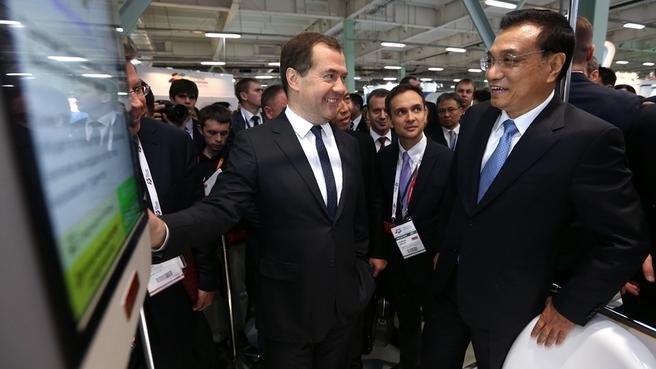
Dmitry Medvedev and Chinese Premier Li Keqiang at the innovative technology exhibition, Third Moscow Open Innovations Forum
Third Moscow International Forum for Innovative Development Open Innovations
Dmitry Medvedev: Ladies and gentlemen, colleagues, welcome to the Third Open Innovations Forum in Moscow. I’d like to begin by thanking my colleague, Premier of the State Council of the People’s Republic of China Li Keqiang, and the large delegation from China, which is a partner sponsor this year, for their contribution. This is a young forum, as everyone here knows, but it is satisfying that interest in it has been growing. Today we are welcoming guests from 47 countries, which is evidence of the global interest in innovation. I’d say that innovation bring us closer together than anything else.
When we talk about innovation, we talk about the future outlook of our world. Technology unites people, changes their lives and expands human potential. This plenary session will focus on a new innovation map for the world. The global economy is searching for development sources. The ability to create, promote and implement innovations is a key factor in competitiveness. The Asia Pacific countries have attained impressive results in the past few years, including China, India, Japan, South Korea, Vietnam, Malaysia and Singapore, which is encouraging talk about the rise of a new global economic pole.
Dmitry Medvedev: "When we speak about innovations, we speak about the future outlook of our world. Technologies unite people, change their lives and expand human capacity."
Russia is
both a European and an Asian country, and we are interested in strengthening
our positions in the Pacific region. We are ready to join forces to create new
markets and integrate with high-tech production chains and sources of added
value. Of course, China and Russia have many opportunities for cooperation in
this area.
Russia and China have long-standing and solid relations in all areas, from culture to energy and industry. The share of high-tech products in our trade is among the largest, although we must admit that our Chinese partners supply more of these goods. In this sense, there is much to be done within our projects.
Our research and technological cooperation is multifaceted. We are implementing cooperative projects in fundamental and applied research in the areas of new materials, environmentally-safe energy efficient technology, biotechnology, chemistry, petroleum chemistry, electronics, information science, mechanical engineering, instrument-making, telecommunications and others. It’s good that academic institutes, universities and research and production associations, as well as public and private companies from various regions and provinces of Russia and China are involved in these projects.
Russia’s Far Eastern Federal University in Vladivostok is actively contributing to cooperation between universities. Other contributors are the association of technical universities of Russia and China, as well as students who take part in joint conferences, exchange research ideas and gain positive experience through intercultural exchanges. We are strengthening ties between our development institutions and are discussing the possibility of creating joint economic zones and venture funds. I hope that one of the practical results of this forum, in which China is a partner this year, will be the appearance of new mutually beneficial Russian-Chinese projects in innovative areas. We are pleased with the fact that next year our Chinese colleagues will attend the Innoprom exhibition in Yekaterinburg, where China will also act as a partner country.
Ladies and gentlemen, friends and colleagues, as the host of this forum, I’d like to introduce a Russian system of supporting innovation activities and to say a few words about what we have done, what we have yet to do and where we have failed. Obviously, this system is still in the process of creation. It’s far from ideal, but still, innovative development remains our priority even amid economic problems. I will try to speak concisely about the main elements and to present the characteristics of this system.
The first thing I’d like to say is this. Over the past years we have greatly increased government investment in innovations, in keeping with the Strategy for Innovative Development to 2020. We have created an innovation support infrastructure that is comparable to what many other countries have. The basic development institutions have started working, but I won’t list them here, as the majority of people present here know about them. These are Vnesheconombank, the Russian Venture Company, Rusnano, the Skolkovo Foundation, the Fund for Assistance to Small Technical Research Companies and others, including private agencies. I’d like to say that from 2007 to 2013, a period during which we began seriously working on innovations, we supported 13,000 projects worth a total of 700 billion roubles.
Dmitry Medvedev: "Over the past years we have greatly increased government investment in innovations, in keeping with the Strategy for Innovative Development to 2020. We have created an innovation support infrastructure that is comparable to what many other countries have."
Second, apart from investing in high-tech projects, the Government has traditionally acted as regulator, like the governments of other countries. We are now trying to streamline this system so as to create an innovation lift of sorts, which implies providing a requisite set of support instruments at all stages, from the creation of an innovative product to implementing an idea in production. We have adopted a set of laws to regulate the innovations sphere, including a law on the Foundation for Advanced Research, under which research institutions and universities can create small research and technology businesses, the law on Skolkovo and a number of other specific laws. It appears that we will need to adopt bylaws and, in some cases, additional laws to further develop this area.
We’ve endorsed state programmes and practically each of them requires innovative development.
The third point I’d like to make is that we are striving to enhance the innovative potential of our major state-owned companies. At first, this task seemed fairly complicated, all the more so since in Russia they play an appreciable role in the economy. They account for about one third of industrial production and around 40 percent of all domestic expense on R&D. This is a very large share.
Innovative development programmes for 60 state-owned companies have been approved on my instructions. The list includes such giant companies as Gazprom, Rosneft, Russian Technologies, Rosseti, Rosatom, Russian Railways, Rostelecom, to name a few. They are increasing investment in R&D. When I meet with their top managers from time to time, they are always pleased to demonstrate what they have achieved in the past three or five years. The most important thing is for this to lead to end results.
Now the fourth point. Government purchases are one more factor in the demand for innovations. The law on the contractual system gives priority to innovative production. There are different economic mechanisms that encourage the use of more efficient solutions, including life-cycle contracts.
In general, the contractual system should be more open for small high-tech companies as well. This is a requirement of the law I’m referring to now.
The roadmap on expanding the access of small and medium-sized companies to purchases by infrastructure monopolies and corporations with state participation is being carried out as part of the National Business Initiative. Naturally, development institutions also play a role in this respect.
The fifth point I’d like to make is that we must concentrate the resources of the state, science and business on launching new major cross-sectoral projects. I’ve approved the plans for developing biotechnology, photonics, composite materials and new production technology. These projects will be based on public-private partnerships. In some cases we plan to establish consortiums with the participation of producers and consumers of innovative products. They may include infrastructure companies, companies with state participation, large and small high-tech firms and, of course, universities.
Dmitry Medvedev: "Russia already has a network of federal and national research universities and leading scientific organisations. Mechanisms for assessing their performance now conform to international standards. Some 135 billion roubles have been invested in R&D and expansion of cooperation between universities and industrial enterprises in the past few years."
The sixth point I’d like to make is that the territorial aspect of innovative policy is no less important. We are in Moscow, which is Russia’s biggest innovative centre, if only because Moscow is the capital and our largest metropolitan area. The Moskva Technology Park, the venue of our forum today, is an interesting platform. Looking around, I see that this is a former workshop. This is a good example of rational development priorities. It is very good that the Mayor’s Office is focusing on this priority. But we want similar innovative centres to appear in other regions as well, and they have already done much in this regard. I won’t mention anyone in particular, but many regions that I visit and where you work are creating new innovative centres, new technology parks and innovative territorial clusters (we have 25 of them already). As a rule, they are located in places with a high concentration of educational, scientific-technical and production potential, such as science cities and free economic zones.
Now my seventh point. This entire system cannot operate without people: scientists, engineers and highly qualified workers. Specialists employed in these centres are the heart of any educational or innovative system. Russia already has a network of federal and national research universities and leading scientific organisations. Mechanisms for assessing their performance now conform to international standards. Some 135 billion roubles have been invested in R&D and expansion of cooperation between universities and industrial enterprises in the past few years.
One more initiative is the Global Education Programme. We are continuing to implement it as well, and those who want to matriculate in bachelors or masters programmes at the world's leading universities will receive support.
Dear friends,
and Premier of the State Council of the People’s Republic of China. To
summarise, I’d like to say that we should all remember some well-known simple
truths. I’d like to recall something that George Bernard Shaw once said: If you have an idea and I have an idea and we exchange these ideas, then
each of us will have two ideas.
This is a simple thought but it is very true. I’m sure the participants of the
forum have lots of ideas.
I’d like to wish all participants in the forum interesting work and useful business contacts that may eventually turn into productive research cooperation. After all, we all want to see our regions, our countries successful, modern and highly efficient, and this is absolutely impossible without innovation technology in the 21st century.
Thank you for your attention.
<…>
